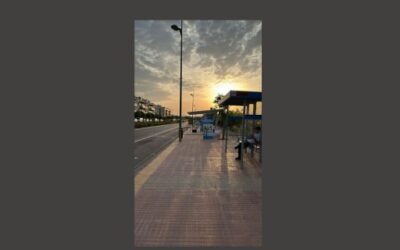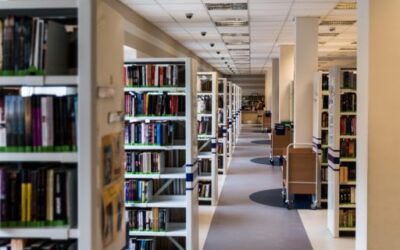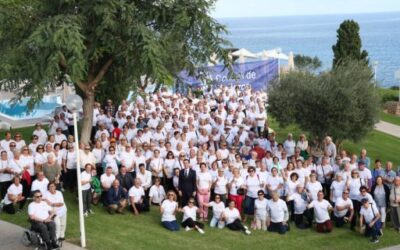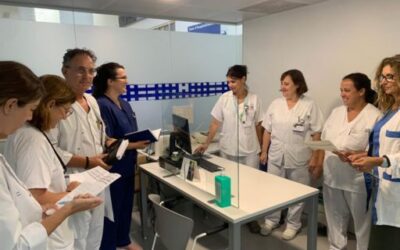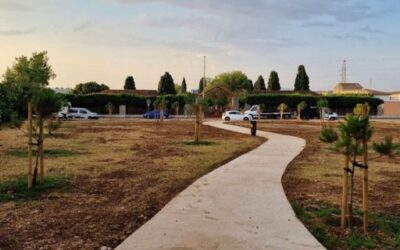Second admission phase for Vocational Training courses 2025-2026 begins today
by David Arreza | Aug 28, 2025 | Current affairs, Featured, Interview, Portada, Post, Revista Lloseta, Thursday Daily Bulletin, Tradition
Starting today, Thursday, August 28, the Ministry of Education and Universities has opened the second phase of the admission process for Vocational Training (FP) programs: grade D (basic, intermediate, and advanced levels) and grade E (specialisation courses) in...
Average retirement pension exceeds €1,500 in August, up 4.4% in one year
by Rosa María Cuerda Riutort | Aug 28, 2025 | Current affairs, Featured, Interview, Portada, Post, Revista Lloseta, Thursday Daily Bulletin, Tradition
Spain’s Social Security system paid out over 10.3 million contributory pensions to nearly 9.4 million beneficiaries in August. The total monthly bill for these benefits reached €13.62 billion, according to the Ministry of Inclusion, Social Security and Migration. The...
New bus shelter installed in Ciutadella to improve passenger comfort and safety
by David Arreza | Aug 28, 2025 | Current affairs, Featured, Interview, Portada, Post, Revista Lloseta, Thursday Daily Bulletin, Tradition
The Island Council of Menorca has installed a new covered structure at the Josep Mascaró Pasarius Avenue bus stop (Ciutadella) to provide shade during the summer months and protection from rain throughout the rest of the year. The project, with an investment of nearly...
Margarita Llabrés Deyá Still Listed on Consell Town Council Website Six Months After Her Dismissal
by Rosa María Cuerda Riutort | Aug 27, 2025 | Current affairs, Featured, Interview, Portada, Post, Revista Lloseta, Thursday Daily Bulletin, Tradition
The official website of the Consell Town Council still presents a completely outdated image of its political reality. Margarita Llabrés Deyá, who was dismissed as second deputy mayor six months ago, continues to appear as if she were part of the municipal government...
Menorca’s Library Network consolidates its growth with a 33.7% increase in visits
by Redacción | Aug 27, 2025 | Current affairs, Featured, Interview, Portada, Revista Lloseta, Thursday Daily Bulletin, Tradition
The Xarxa de Biblioteques de Menorca (XBM) has presented its 2024 activity report, highlighting the consolidation and strong performance of the island’s public library system. Since 2021, usage indicators have shown steady growth, following the 2020 closure due to the...
Teatre Principal de Palma puts tickets and subscriptions for the 25/26 season on sale
by Redacción | Aug 27, 2025 | Current affairs, Featured, Interview, Portada, Post, Revista Lloseta, Thursday Daily Bulletin, Tradition
The Teatre Principal begins its 2025/2026 season and will open its box office this Wednesday, August 27. From 11:00 a.m. on August 27, spectators will be able to purchase their subscriptions both at the box office and online. A few days later, on Monday, September 1,...
The Consell de Mallorca launches 2,000 places to promote active ageing with stays on the island
by David Arreza | Aug 27, 2025 | Current affairs, Featured, Interview, Portada, Post, Revista Lloseta, Thursday Daily Bulletin, Tradition
The Consell de Mallorca is launching a new edition of the “Stays for Seniors” program, which this year offers a total of 2,000 places—double last year’s figure—following the success of the first edition. This initiative aims to promote active ageing, social...
The Morning Project improves hospital management with a new strategy to optimise inpatient beds
by Rosa María Cuerda Riutort | Aug 27, 2025 | Current affairs, Featured, Interview, Portada, Post, Revista Lloseta, Thursday Daily Bulletin, Tradition
This initiative is key to improving hospital efficiency, ensuring faster, more coordinated, and patient-centred care. The Hospital of Manacor has launched the Morning Project, an innovative initiative framed within the hospital’s commitment to innovation and...
Inca completes the Heat Island Mitigation Project with new green areas and more sustainable public spaces
by Redacción | Aug 27, 2025 | Current affairs, Featured, Interview, Portada, Post, Revista Lloseta, Thursday Daily Bulletin, Tradition
The Inca City Council has completed the works of the Heat Island Mitigation Project, a strategic initiative aimed at improving thermal comfort and environmental quality in several public spaces of the city. “We are taking a step forward in our climate adaptation...
Education opens in September the call for grants for parents’ associations and student associations
by David Arreza | Aug 26, 2025 | Current affairs, Featured, Interview, Portada, Post, Revista Lloseta, Thursday Daily Bulletin, Tradition
The Department of Education and Universities will open, between September 1 and 14, 2025, the call for grants aimed at financing activities and operating expenses of parents’ associations (AFA), student associations (AA), and their federations and confederations....
IMAS to Resume Information Sessions on Adoption Next Monday
by Rosa María Cuerda Riutort | Aug 26, 2025 | Current affairs, Featured, Interview, Portada, Post, Revista Lloseta, Thursday Daily Bulletin, Tradition
The Institut Mallorquí d'Afers Socials (IMAS) will resume its information sessions on adoption next Monday, September 1, aimed at individuals and families interested in beginning the adoption process. Professionals from the IMAS Adoption Section organise these...
The Government Brings Forward the Start of ‘Raor’ Fishing in Mallorca and Menorca’s Inland Waters by One Day
by Redacción | Aug 26, 2025 | Current affairs, Featured, Interview, Portada, Post, Revista Lloseta, Thursday Daily Bulletin, Tradition
This exceptional modification was approved by the Co-management Commission of Recreational Fishing of the Balearic Islands, following a proposal from the sector supplying materials for raor fishing. The aim is to promote traditional recreational fishing activity. The...
Our writters
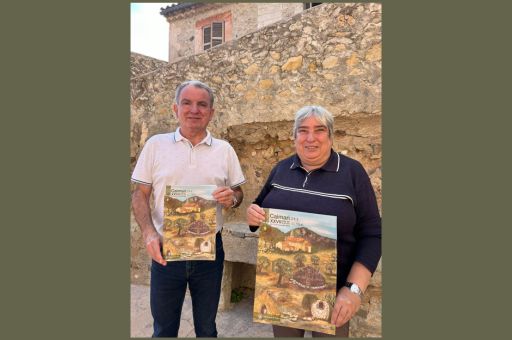
XXVII Fair of S’Oliva de Caimari
The mayor of Selva, Joan Rotger, and the mayoress of Caimari, Ana Maria Roger, have presented the events of the S’Oliva de Caimari Fair to be held on 15th, 16th and 17th November.
This emblematic fair dedicated to the culture and tradition of the olive in the town of Caimari reaches its 27th edition with the intention of making known and enjoying the olive-growing tradition that defines our municipality.
During the fair, you will be able to discover a wide variety of products derived from olives, from virgin olive oil to gastronomic delicacies made with local products. In addition, we will have demonstrations and tastings of our products, as well as exhibitions on the history and culture of the olive in Caimari.
We look forward to seeing you at the 27th S’Oliva de Caimari Fair.
TDB keeps you informed. Follow us on Facebook, Twitter and Instagram
XXVII Fair of S’Oliva de Caimari
FRIDAY 15TH
Distribution of olive branches.
18:00 h. Opening of the Església Vella to visit the exhibition of paintings by Maria Muntaner and Joan Perelló.
19:30 h. Concert by the Selva Municipal Band.
Venue: Church of the Immaculate Conception of Caimari.
21:30 Oil tasting
By local farmers and producers with musical entertainment.
In collaboration with: Bar Ca Na Tome.
Bar Ca Na Tome, will make a special Fair toast dinner.
Franquesa Street n.°4
SATURDAY 16TH
10:00 h Opening of the Fair.
Exhibition of antique motorbikes.
By Jaume Damià.
Place: Sa Vileta street.
Exhibition of posters of the Caimari Fair.
Exhibition of Randas and Embroidery of the Women of the 3rd Age of Caimari.
Place: Horizonte Street.
Opening to the public of the old Tafona-Museum of Caimari.
Exhibition of machinery and utensils for making oil.
Place: Plaza Mayor de Caimari.
Tasting and sale of olives and all kinds of virgin olive oil by local producers.
Inauguration and exhibition of paintings by:
MARGALIDA MUNTANER, a painter from our town.
JOAN PERELLÓ, painter and sculptor will exhibit his works in the Església Vella de Caimari.
11:00 h Presentation of the II Edition of the Olive Academy.
This year dedicated to OLIVE HARVESTS.
The Mayoress of Caimari, Ana María Rotger Mestre ‘Mari Tome’ will dedicate a few words to the women olive harvesters, recalling their dedication, sacrifice and love for the trade.
Presentation of the audiovisual dedicated to Les Collidores de Oliva de Caimari.
16:00 h Reception of the Authorities.
Accompanied by xeremiers of the municipality to visit the XXVII Fair of S’Oliva de Caimari.
Start in the street of Ca S’Hereu.
17:30 h Departure of the Caparrots Carboners de Caimari accompanied by the Xeremiers.
Start in Es Castellet.
First dance of the Caparrots Carboners, in front of Sa Tafona Vella de Caimari.
Then: Parade of the Caparrots Carboners through the streets of the Fira.
18:00 h Dance of the Caparrots Carboners accompanied by the Band of Music of the Municipality of Selva.
Place: Plaza Mayor de Caimari.
20:00 h Folklore Show
With the performance of the Agrupación Aires de Monte de Selva.
Place: Plaza Mayor de Caimari.
21:00 Sobrasada tasting with honey.
Collaboration: Association of Elderly People of Caimari.
Place: In front of the Casa del Pueblo de Caimari, Plaza Mayor.
SUNDAY 17TH
10:00 h Opening of the Fair.
Exhibition of old motorbikes.
By Jaume Damià.
Place: Sa Vileta street.
Exhibition of posters of the Caimari Fair.
Exhibition of randas and embroidery by the Women of the 3rd Age of Caimari.
Place: Horizonte street.
Exhibition of paintings and sculptures by:
Margalida Muntaner
Joan Perelló
Place: Old Church of Caimari.
Demonstration of how to make sheep’s milk cheese.
Place: Plaza Mayor.
Display of craft stalls throughout the Fira.
Prize-giving ceremony for the Best Local Parade.
Presentation of the prize for the Best Fair Parade.
11:30 h Dance of the Caparrots Carboners accompanied by the Band of the Municipality of Selva.
Place: Clasta de Son Albertí. Placeta Vieja.
Then: Parade of the Caparrots Carboners, through the streets of the Fira.
12:00 h Dance of the Caparrots Carboners accompanied by the Band of the Municipality of Selva.
Place: Plaza Mayor de Caimari.
17:30 h Popular Dance with the music of Ballugam.
Place: Plaza Mayor de Caimari.
19.00 h Parade with the Xeremiers of the municipality.
20.00 h Closing of the XXVII Fair of S’Oliva de Caimari.

Water reserves in the Balearic Islands increase to 46% during September
The Artà Demand Unit goes on alert, activating the measures of the Special Action Plan for Situations of Alert and Possible Drought.
Water reserves in the Balearic Islands have increased to 46% during September, an increase of 3 percentage points over the previous month, but still 6 points less than in the same period last year, when they stood at 52%. This situation continues to call for rigorous monitoring and responsible management of available resources.
TDB keeps you informed. Follow us on Facebook, Twitter and Instagram
Water reserves in the Balearic Islands increase to 46% during September
This month there has been a change of scenario: the Artà Demand Unit (UD) has gone on alert. Thus, the UD of Artà, es Pla and Formentera are currently in the alert scenario, activating the measures established in the Special Plan of Actions in Situations of Alert and Possible Drought. These measures include the limitation of garden irrigation, street cleaning, ornamental uses and beach showers by the managing entities without connection to desalination plants, as well as restrictions on water supply in rural areas and the promotion of awareness campaigns by the administrations.
Meanwhile, 82.2% of the Balearic Islands territory, comprising the UD of Menorca, Manacor-Felanitx, Migjorn, Palma-Alcúdia, Tramuntana Norte, Tramuntana Sur and Eivissa, remains in pre-alert.
About the evolution of bookings by Demand Unit, four DUs have registered a decrease: Artà, Manacor-Felanitx, Tramuntana Sur and Formentera, while three DUs have experienced an increase: Menorca, Migjorn and Tramuntana Norte. The UDs of es Pla, Palma-Alcúdia and Eivissa have remained stable. The general index for the demarcation is 0.365, a slight increase compared to the previous month, but lower than last year (0.429) and two years ago (0.438).
As for the percentages of bookings by island, Mallorca has risen from 43% to 47%, Menorca has increased from 39% to 44%, and Eivissa has increased slightly from 32% to 33%. Despite this improvement, the overall situation in the Balearic Islands is still less favourable than it was a year ago.
According to AEMET data, September was a normal month in terms of rainfall, with an average of 48.8 l/m² compared to the usual 61.2 l/m². By islands, Menorca recorded 48.1 l/m² (vs. 56.9 l/m²), Mallorca 49.0 l/m² (vs. 62.7 l/m²) and Eivissa 55.3 l/m² (vs. 60.1 l/m²). In contrast, Formentera had a dry month, with only 22.2 l/m² (vs. 42.6 l/m²).
The percentage of accumulated annual rainfall in the Balearics stands at 76%, with Mallorca at 77%, Menorca at 87% and the Pitiusas at 56%. In terms of temperatures, the month of September has been considered normal, with an average temperature of 22.1ºC and an anomaly of -0.2ºC.
Considering the current situation and the recorded rainfall, it is expected that stocks may continue to increase during the month of October, with no significant changes in the scenario expected.
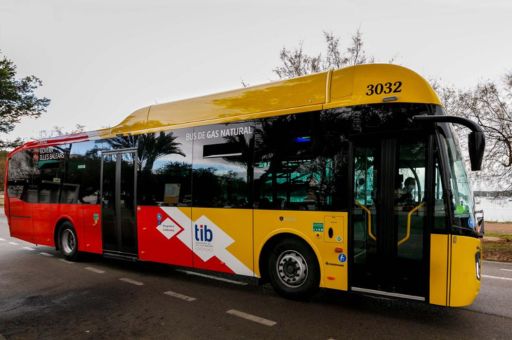
The number of passengers travelling on TIB buses rises by 42% in the first four months of 2024
Nearly 6.5 million passengers travelled on TIB between January and April, an increase of 1.9 million (42%) compared to the same period last year.
The Ministry of Housing, Territory and Mobility of the Government of the Balearic Islands, through the Transport Consortium of Mallorca (CTM), has recorded in the first four months of the year, from January to April 2024, nearly 6.5 million passengers who have travelled on the TIB bus, which represents an increase of 42.2% in the number of users compared to the same period of 2023, when free travel on all public transport was already in force.
TDB keeps you informed. Follow us on Facebook, Twitter and Instagram
The number of passengers travelling on TIB buses rises by 42%
During the first four months of this year, the increase was more than 1.9 million passengers compared to the same period in 2023, from 4.5 million to nearly 6.5 million. This 42% increase in demand for TIB network buses comes between two periods in which free transport had already been introduced for users travelling with the Intermodal Card.
At present, the interurban public transport of the TIB network connects the different municipalities and areas of Mallorca with 71 bus lines. To cope with the increase in demand, both during the winter season and in the new service for the summer season, reinforcement measures have been adopted, mainly to increase frequencies on the bus lines.
During the winter season, from 1 November to 21 March, the TIB network was reinforced with an increase of 27 bus lines compared to the previous winter, an improvement of 53% of the total number of lines operating in this period. Likewise, for the summer season, this year the start of the reinforcement of the service was brought forward to 22 March compared to the last high season.
For the summer season, frequencies have been increased on a total of 24 bus lines, resuming service on sixteen lines and incorporating a new line (131) in the Serra de Tramuntana, between Santa Ponça, Banyalbufar and La Granja de Esporles.
Ten new compressed natural gas buses are expected to be added to the TIB’s current sustainable fleet in the coming weeks, increasing the current fleet, which currently has 201 compressed natural gas buses and eighteen electric buses.
About the reinforcements adopted for the summer season, in the Ponent area, the nuclei of Palmanova and Magaluf (104) have been better connected with services every 15 minutes in each direction, and, compared to last summer, the improved offer in the tourist area of Costa de la Calma also stands out, which almost doubles connectivity with Palma and Santa Ponça, with a new frequency of 25 minutes.
In the northern area of Mallorca, the late-night service on the suburban line connecting Alcúdia-Can Picafort (324) has been reinforced, reaching beyond 00.00 h with a stable frequency of 12-13 minutes; line 302 has been improved compared to 2023 by increasing the frequency to one bus every twenty minutes during peak hours and extending the service until 0. 10 am to ensure that hotel and restaurant workers can return home; and in the centre of Cala Sant Vicenç, line 321 has brought forward the daily start time to 7.10 am.
On the Llevant coast, the Cales de Mallorca line (416) has increased its services by 50% since the end of March, and in the Migjorn area, the Campos-Palma express services (501) have been added throughout the day. Concerning the Aerotib lines that connect with Palma airport, the A32 and A42 lines have increased their service by 10 % compared to the summer of 2023.

The number of people who have quit smoking in the last year after attending a group intervention at a health centre has doubled
Primary Care of Mallorca has prepared a campaign to disseminate on social networks on the occasion of the XXV Smoke-free Week
Primary Care of Mallorca has managed to double the number of people who quit smoking in 2023, compared to 2022, after participating in a smoking cessation group in health centres throughout Mallorca. These are group interventions to quit smoking (with the accompaniment and advice of health professionals) that are offered in the health centres of Mallorca to all those people who are considering quitting smoking. Thus, in 2022, a total of 91 smokers managed to give up the habit at the end of the group therapy. This figure rose to 184 people in 2023.
TDB keeps you informed. Follow us on Facebook, Twitter and Instagram
The number of people who have quit smoking in the last year
Precisely in 2023, 38 smoking cessation treatment groups were set up in 24 health centres in Mallorca. These groups brought together a total of 667 patients, of whom 184 have managed to quit smoking.
This week is the 25th No Smoking Week, which culminates on Friday with World No Tobacco Day (31 May). This initiative, which is part of the Spanish Society of Family and Community Medicine (SEMFYC), is organised this year with the slogan ‘Zero emissions in your lungs too’.
Primary Care of Mallorca participates in this Smoke-Free Week with its commitment to promote health with a campaign that will be disseminated on social networks with the aim of raising awareness and motivating all those people who can not quit smoking or who have tried several times. These are testimonies of people who show that it is not the time or the number of attempts that matter, but the intention and commitment to oneself to give up smoking as many times as necessary until it is finally achieved.
The prevention and fight against smoking has been one of the commitments of the Primary Care Management of Mallorca for decades. In this sense, among other initiatives, numerous group and individual interventions have been carried out to stop smoking and informative community prevention activities to raise awareness among the population about the importance of a smoke-free life. Primary Care in Mallorca also has referents in each health centre who advise and provide the necessary tools to tackle smoking.
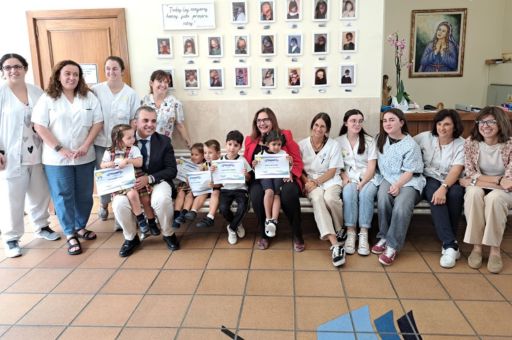
The Pilot Plan for Childhood Immunisation against the flu has now been completed in 16 schools
The councillor for Health, Manuela García, and the councillor for Education, Antoni Vera, attended the vaccination of 237 children at the Santa Mónica school in Palma, 65% of those vaccinated.
The pilot school immunisation plan continues, with 2,900 students born between 2019 and 2021 to be vaccinated.
The councillor for Health, Manuela García, accompanied by the councillor for Education, Antoni Vera, went today to the Santa Mónica school in Palma to show her support for the flu vaccination of 237 children in the second cycle of infant education, 65% of the 365 children enrolled in the school at these educational levels.
TDB keeps you informed. Follow us on Facebook, Twitter and Instagram
The Pilot Plan for Childhood Immunisation against the flu has now been completed in 16 schools
The heads of Health and Education were accompanied during their visit to the Santa Mónica school by the director of Primary Care Nursing, Victòria Pascual, and Toñi Tarongí, pedagogical director of Infant and Primary Education, among other authorities.
Manuela García welcomed the high percentage of pupils whose parents gave their permission for them to be vaccinated and thanked them for their responsible attitude, reminding them that vaccination is recommended for this group of healthy children because the flu does not cause the most common symptoms of the epidemic disease, such as fever and fatigue, among them. ‘Young children who contract the flu can have serious complications such as pneumonia, asthma attacks or otitis,’ he said.
Vaccination is also recommended for this group even though the lethality rate among children under 15 years of age is very low. Ninety-five per cent of children who die from the disease are under five years of age.
Moreover, this age group has the second highest rate of hospitalisation and ICU admission due to influenza after the elderly. Not to mention the role that these children play in transmitting the flu in their homes and with their close relatives, sometimes elderly and fragile people in whom contagion can have tragic consequences.
These children under five years of age have been immunised as part of the pilot child vaccination plan, which was launched in coordination with the Ministries of Health and Education on Monday 14 October and will continue until 14 November. In this pilot scheme, 2,900 schoolchildren born between 2019 and 2021 from 24 public and state schools on the islands, as well as one private school, will be able to be immunised in their school. Eleven schools in Mallorca, eight in Ibiza and Formentera and five in Menorca are participating in this plan. This pilot plan has already been completed in 16 schools.
The acceptance rates for this vaccination at school have been as follows, by island: in Mallorca, 52%; 40% in Menorca; 32.3% in Ibiza and 50% in Formentera.
The children participating in this pilot plan are immunised in complete safety. Nurses from the health centres closest to the schools come to the classrooms with a first-aid kit to treat any possible adverse effects of the vaccines and remain there for up to half an hour after the last child has been immunised to prevent them from occurring. Children with severe egg allergies or intolerances or those with significant immunodeficiency will be excluded from this school vaccination.
Children aged 2 years to 4 years and 11 months have been given a convenient and painless intranasal flu vaccine. For the youngest children, from six months to two years of age, an inactivated injectable vaccine will be administered.
307 million euros in European aid awarded to 381 local authorities to renovate public buildings
The Ministry of Transport, Mobility and Urban Agenda (Mitma) has provisionally awarded these ‘Pirep local’ grants, which will directly benefit some 16 million citizens.
The Ministry of Transport, Mobility and Urban Agenda (Mitma) has provisionally granted 307 million euros of European recovery funds to 381 local authorities in all provinces for the rehabilitation of public buildings owned by them.
TDB keeps you informed. Follow us on Facebook, Twitter and Instagram.
The Mitma’s electronic headquarters has published this provisional resolution of the call in competitive concurrence of Line 1 of the Programme to Promote the Rehabilitation of Public Buildings (Pirep local) included in the Recovery, Transformation and Resilience Plan (PRTR).
In total, Mitma has selected 405 actions out of the 1,065 presented by the potential beneficiaries of the programme: municipalities, provincial councils, councils and island councils. At this point, it is worth remembering that municipalities with more than 50,000 inhabitants and provincial capitals could submit two applications, so there are 24 municipalities that have obtained funding for two rehabilitation projects.
Even so, the municipalities with less than 50,000 inhabitants are of particular relevance in the provisional resolution, with 321 projects awarded, which are entitled to aid of some 186 million euros, with an average subsidy per application of 579,531 euros. Of these 321 projects, 172 are in municipalities with less than 5,000 inhabitants, the so-called demographic challenge municipalities.
After the publication of the list, the selected local entities will have a period of 10 days to expressly accept the grants, before the final resolution is published.

Can Bordils will be one of the main venues for the activities of the European Day of Youth Culture
14th October 2024
The programme, organised by the Jewish Community of the Balearic Islands with the support of the City Council, will begin this Tuesday with a conference by the biblical scholar and theologian Jaime Vázquez on the Dead Sea manuscripts.
Palma, 14th October 2024. This Monday, the Can Bordils premises, the headquarters of the Arxiu General de Palma, hosted the presentation of the European Youth Culture Day, which will be held from the 15th to the 29th of October, organised by the Comunitat Jueva de les Illes Balears and with the collaboration of the Ajuntament de Palma.
TDB keeps you informed. Follow us on Facebook, Twitter and Instagram
Can Bordils will be one of the main venues for the activities of the European Day of Youth Culture
The programme includes different activities to disseminate some of the most deeply-rooted historical and cultural aspects of the Jewish legacy, through lectures, round tables, film screenings, guided tours and musical concerts.
On behalf of the City Council, the Director General of Heritage and Interpretation of the City, Pilar Ribal, attended the informative meeting. Also present were the president of the Comunitat Jueva, Ariel Girondi, and its vice-president, Miquel Segura.
During his speech, Ribal stressed that this is ‘an essential date with the history of Palma’, where, he said, the Jewish imprint ‘has made a decisive contribution to the evolution of the capital of the Balearic Islands, which is indebted to this tradition and culture, its rich heritage and values that have been transmitted and strengthened from generation to generation’.
Can Bordils is one of the main stages of the programme of the European Day of Youth Culture, hosting three activities, all of which will begin at 19:00.
On Tuesday, the conference ‘The Dead Sea Scrolls. The story of their discovery’, which will be given by the biblical scholar, theologian and journalist Jaime Vázquez Allegue.
This speaker has spent more than 25 years studying these manuscripts, which were found in 1947 in the desert of Judah, constituting, according to experts, the greatest archaeological discovery of the 20th century.
In fact, the documents that the speaker will discuss contain the oldest texts of the Hebrew bible and a large collection of writings that outline the social, political and religious context of Jerusalem.
Jaime Vázquez is a tenured professor at CESAG and holds a PhD in Biblical Theology from the Pontifical University of Salamanca.
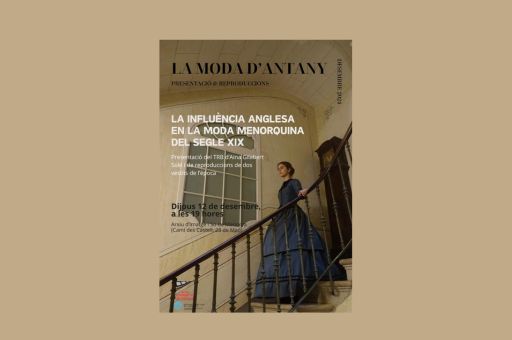
Presentation: The English influence in 19th-century Menorcan fashion
The presentation will take place at the Arxiu d’Imatge i So de Menorca next Thursday 12th December at 7pm in the auditorium of Can Victorii in Maó.
Within the framework of the exhibition ‘LA MODA DE ANTAÑO. Como se vestía en Menorca entre 1850 y 1930’ the Arxiu d’Imatge I So de Menorca proposes a new activity to present the fashion of those years.
TDB keeps you informed. Follow us on Facebook, Twitter and Instagram
Presentation: The English influence in 19th-century Menorcan fashion
Aina Gilabert Solé has done her baccalaureate research work on the English influence on 19th-century Menorcan fashion and has completed it with the creation of two reproductions of dresses from the period. Thus, on Thursday 12th December at 7 p.m. in the auditorium of Can Victori in Maó, she presented the results of this research.
The activity will consist of an explanation of how the historical research was carried out and the results, as well as the presentation of the reproductions of the dresses and the challenges she had to face when sewing them.
The presentation of the work ‘THE ENGLISH INFLUENCE ON 19th CENTURY MENORCAN FASHION’ will take place on 12th December at 7 p.m. in the auditorium of Can Victori in Maó (Camí des Castell, 28). Free access.
Exhibition ‘LA MODA DE ANTAÑO. How people dressed in Menorca between 1850 and 1930’. Auditorium of Can Victori de Maó (Camí des Castell, 28). Visiting hours: Monday to Friday from 9 am to 1.30 pm and on Tuesdays and Thursdays from 4.30 pm to 8 pm.

The Government approves the fifth payment of 2024 housing rental aid, reaching €7.4 million for more than 3,100 beneficiaries
All information about these grants can be found at ajudeslloguer.caib.es
The Ministry of Housing, Territory and Mobility of the Government, through the Directorate General of Housing and Architecture, has approved the fifth payment of the 2024 housing rental aid program, amounting to nearly €1.7 million for 715 beneficiaries.
The payment resolution was published this Tuesday in the BOIB (Official Gazette of the Balearic Islands), and all details of these grants can now be consulted on the website ajudeslloguer.caib.es.
TDB keeps you informed. Follow us on: Facebook, Twitter and Instagram
The Government approves the fifth payment of 2024 housing rental aid, reaching €7.4 million for more than 3,100 beneficiaries
With this fifth payment resolution for the 2024 aid program, a total of €7.4 million has been disbursed so far to 3,133 beneficiaries.
Regarding the distribution by island, of the total 2024 aid granted:
- 2,259 beneficiaries in Mallorca, amounting to €5.3 million;
- 586 in Menorca, exceeding €1.3 million;
- 240 in Ibiza, nearly €640,000; and
- 48 beneficiaries in Formentera, totalling around €118,000.
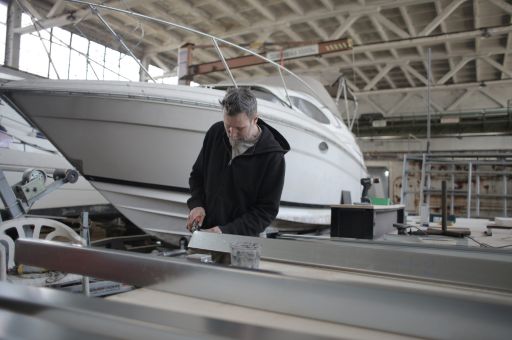
The Regional Ministry of Education implements the intermediate level of VET in Boat Maintenance at CIFP Can Marines from September
This new cycle responds to the demands of the need to incorporate studies linked to the nautical sector.
Students will do their paid internships at the facilities of members of the Association of Industries and Nautical Services of Ibiza and Formentera
The Department of Education and Universities incorporates the middle grade of Vocational Training in Maintenance of Recreational Boats in the intensive dual mode in the Integrated Vocational Training Centre (CIFP) Can Marines of Santa Eulària des Riu, on the island of Ibiza, which will begin to be taught next September. Fifteen places will be offered for this degree.
TDB keeps you informed. Follow us on Facebook, Twitter and Instagram
The intermediate level of VET in Boat Maintenance at CIFP Can Marines from September
The Regional Minister of Education and Universities, Antoni Vera, accompanied by the Director General of Vocational Training and Educational Planning, Maria Isabel Salas; the territorial director of Education in Ibiza and Formentera, Juan Álvarez, the president of the Association of Nautical Industries and Services of Ibiza and Formentera, Ramon van der Hooft, and the director of CIFP Can Marines, Pep Marí Tur, today presented the new studies, which will be taught for the first time in Ibiza and which will respond to the needs and demands of the nautical sector of the Pitiusas.
Students enrolled in the new intermediate degree will do their internships at the facilities of members of the Association of Nautical Industries and Services of Ibiza and Formentera. The studies will be taught in dual intensive regime, which means that students will have an employment contract and remuneration during their training.
The incorporation of these studies responds to the claims of companies in the sector, which warn of the lack of skilled labour. Professionals with this profile are in great demand in Ibiza, and in response to this need, the Regional Ministry of Education and Universities has decided to incorporate this educational offer, which has a high labour market insertion rate.
These studies are already offered in Mallorca and Menorca, and now they are also being incorporated into the CIFP Can Marines, where the intermediate degree in Navigation and Coastal Fishing Technician and the advanced degree in Maritime Transport and Deep-sea Fishing are already being offered.
Inés Bennasar
Inés Bennasar helps those most in need, from Bunyola. This mother of 14 cats, 1 dog, 4 sheep and 1 pig, will be in charge of giving voice to all those little balls of love, who have not been so lucky. This way we will know that second chances exist and we will put emphasis on looking for them.

7.6 million is allocated to the entity Servicios de Teleasistencia SA for the agreement from 2024 to 2026
The entity will manage 13,000 terminals between basic and advanced TAD in 2024, 14,800 in 2025 and 15,900 in 2026.
The budget distribution is 483,760 euros in 2024, 3,610,630 in 2025 and 3,587,677 in 2026.
The Consell de Govern has authorised the councillor for Families and Social Affairs to allocate a maximum expenditure of 7,682,067 € for the agreement with the entity Servicios de Teleasistencia SA for the home telecare service for people in a situation of dependency from October 2024 to September 2026.
TDB keeps you informed. Follow us on Facebook, Twitter and Instagram
7.6 million is allocated to the entity Servicios de Teleasistencia SA for the agreement from 2024 to 2026
The distribution of the budget is as follows:
483,760 € in October and November 2024 concerning the number of terminals previously contracted (7,200 basic TAD and 4,800 advanced TAD. The newly contracted terminals (800 basic TAD and 200 advanced TAD) will be with the effects of the agreement.
3,610,630 from December 2024 to November 2025.
3,587,677 from December 2025 to September 2026.
Currently, of the 12,000 terminals contracted by Servicios de Teleasistencia SA, 7,200 terminals are basic TAD and 4,800 are advanced TAD. The request that the entity has formalised is to manage: 8,000 basic TAD terminals and 5,000 advanced TAD terminals in 2024, 8,600 basic TAD terminals and 6,200 advanced TAD terminals in 2025, and 8,500 basic TAD terminals and 7,400 advanced TAD terminals in 2026.
The reference price per terminal/month is 14.96 € (VAT included) for basic TAD and 24.44 € for advanced TAD in 2024, 16.65 € (VAT included) for basic TAD and 26.30 € for advanced TAD in 2025 and 18.37 € (VAT included) for basic TAD and 28.17 € for advanced TAD in 2026.
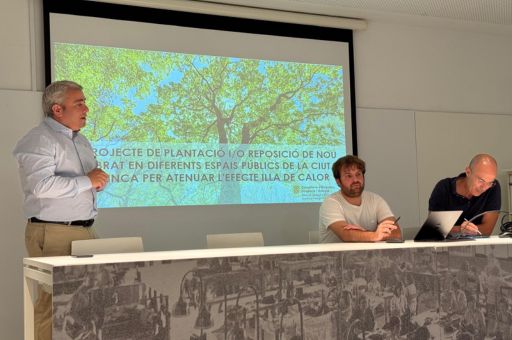
Inca will improve the city’s street furniture to mitigate the heatwave effect
Inca City Council is promoting a project to plant and replace new trees in different public spaces in the city to mitigate the heatwave effect. Thus, the corresponding tenders have already been launched and it is expected that at the beginning of next year work will begin in the different areas and, progressively, work will be carried out in the affected streets. At the same time, an information session was also held to explain the details of the project and all the initiatives that will be carried out over the next few months to the citizens of the town.
TDB keeps you informed. Follow us on Facebook, Twitter and Instagram
Inca will improve the city’s street furniture to mitigate the heatwave effect
‘The tree planting plays a fundamental role in the environmental quality of the city. That is why we have promoted this project to make a decisive contribution to improving the management and use of urban green infrastructure. The regulation of the temperature or the capture of pollutants are some of the positive effects of the trees that directly affect people’s health’, explains the mayor of Inca, Virgilio Moreno.
Thus, the general objectives of this project are to improve green infrastructures and link them to the natural context, to increase resilience in the face of climate change and to guarantee the quality and accessibility of public spaces. Likewise, these actions will also help to lower the city’s temperature, reduce solar radiation during the hottest months, increase CO2 capture and oxygen production, reduce pollution (O3, CO, NO2, PM2.5, PM10, SO2), increase carbon capture, reduce pollution (O3, CO, NO2, PM2.5, PM10, SO2), increase carbon sequestration, reduce pollution and increase infiltration.
The specific areas of action of this project are Carrer Marjades, Carrer Josep Barberí, Carrer Joan Miro, Carrer Sor Clara Andreu, Carrer Joan d’Àustria, Avinguda Jaume I and Avinguda Jaume II. The work being carried out as part of this project includes increasing the tree cover on the streets, removing trees in poor condition or that interfere with services, buildings or installations, increasing the permeable area of the scarcely accessible area and improving pedestrian walkways to improve accessibility, among other things.
This project is co-financed by the Conselleria d’Empresa, Ocupació i Energia within the framework of the public call for subsidies to local entities for actions to adapt to climate change in urban and peri-urban areas. The subsidised amount is 300,000 euros.
Carla Beltrán Campomar
Carla is a student of the Second Baccalaureate at IES Binissalem. Since she was a child, she has shown great admiration for the media. So much so that in the future, she would like to become a reporter. Despite her little experience in the world of journalism due to her young age, her passion for exhibiting her personal work to the public has led her to participate in numerous dance competitions, plays, concerts and the occasional appearance on the provincial television of the Balearic Islands (IB3) and on the municipal television of Palos de la Frontera, Huelva (TCD).
Ramón Planes Socies
ESCAC student in Terrassa will teach us how to tell stories from any of the disciplines taught at ESCAC: directing, art direction, documentary, screenwriting, editing, production, sound design or visual effects production.

Youth and Children presents an institutional campaign to make violence against children visible
The Ministry of Youth and Children has presented the institutional campaign Signs that could mean a lot, with the aim of raising awareness against violence against children and adolescents.
Institutional campaign to make violence against children visible: ‘Signs that could mean a lot’.
The campaign encourages people to pay attention to the signs that can give away these types of situations, which are often invisible or even normalised.
TDB keeps you informed. Follow us on Facebook, Twitter and Instagram
Youth and Children presents an institutional campaign to make violence against children visible
Violence against children and adolescents is often minimised or relegated to the private sphere. They have a strong impact on the physical, emotional and social development of children and adolescents, and can limit the life projects of those who suffer them.
The Minister for Youth and Children, Sira Rego, said: ‘The silence surrounding the violence suffered by a child or adolescent speaks of society as a whole, of our lack of care and respect for children’s rights. To break this invisibility and combat it requires a commitment at all levels, from institutions to those who work or spend time with children, including families.
Children and young people who experience violence often find it difficult to put words to what is happening to them, especially younger people. The campaign encourages paying attention to signs that may indicate that someone is suffering from violence, such as sudden changes in behaviour, uncontrolled fears, somatisation, mutism, avoidance of people or places they used to like, fear of undressing, self-harm or violent play.
‘Just as society has realised that male violence against women is unacceptable and that it must be expelled from all public and private spheres, we must act forcefully to eradicate violence against children and adolescents’, added the minister.
Rego presented the campaign together with the Director General for the Rights of Children and Adolescents, Sandra de Garmendia, who stressed that regardless of whether it is physical or psychological violence and who perpetrates it against them, violence against children and adolescents is ‘unacceptable’.
‘They violate their fundamental rights, recognised in article 39 of the Spanish Constitution and in various international treaties such as the United Nations Convention on the Rights of the Child,’ the director general stressed.
Signs that could say a lot follows in the wake of two previous institutional campaigns, promoted by the Directorate General for Children and Adolescents. The campaigns are part of the efforts to eradicate violence against children promoted by the Organic Law for the Comprehensive Protection of Children and Adolescents against Violence ( LOPIVI).
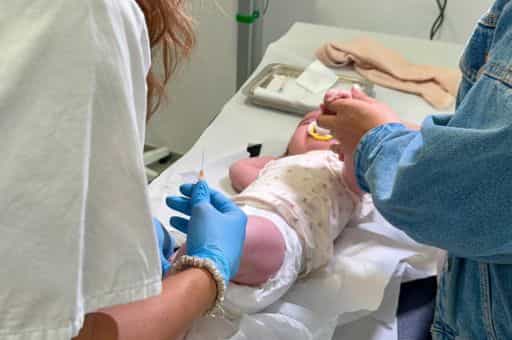
Health reinforces child vaccination against pneumococcus with a more complete vaccine
From this April, the Balearic Islands will improve the children’s vaccination schedule with the inclusion of the 20-valent pneumococcal conjugate vaccine. Until now, and since 2016, babies have been immunised against 13 serotypes in three doses. From this April, and following the authorisation of the European Medicines Agency for the use of the 20-valent pneumococcal conjugate pneumococcal vaccine, the Balearic Islands will be the first Autonomous Community to include this booster vaccine in the children’s vaccination schedule.
TDB keeps you informed. Follow us on Facebook, Twitter and Instagram
Health reinforces child vaccination against pneumococcus
The Director General of Public Health, Elena Esteban, explained this morning, in a presentation at the Palmanova health centre, all the details of the vaccine recently incorporated into the children’s vaccination schedule, which can achieve up to four times more protection than the previous vaccine of 13 serotypes, taking into account the circulating serotypes.
As explained by Elena Esteban, who was accompanied by the coordinator of the Primary Care vaccination centre, Verónica Vega, the immunisation of babies with the new drug will be carried out in four doses: at 2, 4 and 6 months, with a booster at 11 months.
This booster vaccine with 20 serotypes has been included in the adult population’s schedule as a single dose since last October. Vaccination against pneumococcal disease in adults is indicated for people aged between 65 and 75 years and people with risk factors for invasive pneumococcal disease: transplant recipients, cancer patients, immunocompromised people, people with immunodeficiencies, cardiovascular or respiratory diseases or people institutionalised in nursing homes.
The Directorate General of Public Health of the Regional Ministry of Health has purchased 40,000 doses for the period between 31 March 2024 and 30 March 2025, with an investment of 1,961,000 euros. Of these, 25,500 doses are expected to be administered to the paediatric population, which usually achieves a vaccination coverage of 90%.
Pneumococcal pneumonia and invasive pneumococcal disease (IPD) are a major health problem, mainly associated with the existence of risk factors and also related to age. In Spain, in recent years, the National Epidemiological Surveillance Network (RENAVE) has recorded between 3,000 and 4,000 cases per year, mainly affecting children under five years of age and older people.
Vaccination is an essential tool to prevent invasive pneumococcal disease, and for this reason, the vaccine was included in the children’s schedule in 2016. In the case of older people, the vaccine was already administered to people in at-risk groups and 2018 the Public Health Commission approved universal vaccination at 65 years of age.

Minimum Vital Income reaches nearly 2.3 million people in July
In July 2025, the Minimum Vital Income (IMV) reached 2.3 million people across 752,469 households, including 129,655 single-parent families. In more than two-thirds of these households, there are minors, who account for 41.2% of all beneficiaries (947,903 children and adolescents).
The average monthly payment per household was €519.16, with a total payout of €426.3 million in July. Compared to July 2024, there are 112,501 more active benefits (+17.6%) and 370,570 additional beneficiaries (+19.2%).
TDB keeps you informed. Follow us on: Facebook, Twitter and Instagram
Minimum Vital Income reaches nearly 2.3 million people in July
The IMV’s profile remains predominantly female: 67.8% of recipients and 53.5% of total beneficiaries are women. Minister Elma Saiz highlighted its impact on single-parent households, especially those headed by women, providing stability in challenging times.
A key tool in tackling child poverty is the Child Support Supplement (CAPI), which in July benefited 527,071 households. Payments amount to €115 for children aged 0–3, €80.5 for ages 3–6, and €57.5 for ages 6–18. The average was €67.7 per child and €124.6 per household with minors.
Since its launch in 2020, the IMV has supported 3.17 million people (1.37 million children) and represented a total investment of €16.204 billion.
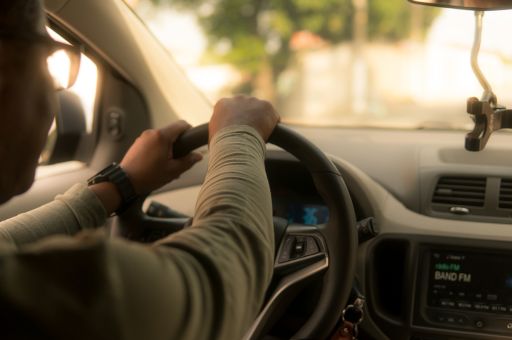
The Consell de Mallorca meets with car hire companies to study solutions to the saturation of roads
The Minister of Territory, Mobility and Infrastructures, Fernando Rubio, today received representatives of AEVAB and BALEVAL to gather their contributions to the study of the road network load that the island institution is preparing.
TDB keeps you informed. Follow us on Facebook, Twitter and Instagram
The Consell de Mallorca meets with car hire companies
The Minister of Territory, Mobility and Infrastructures, Fernando Rubio, met today with representatives of the two car hire associations of the Balearic Islands to study measures agreed with the sector to study solutions to the saturation of Mallorca’s roads. Rubio was accompanied by the island directors of Mobility, Rafael Oliver, and Infrastructures, Rafel Gelabert. The delegation from the Agrupación Empresarial de Alquiler de Vehículos con y sin Conductor de Baleares (AEVAB) was headed by its president Ramon Reus. For its part, the Balearic Association of Car Rental with and without Driver (BALEVAL) was represented by its board of directors, chaired by Othman Ktiri.
Fernando Rubio explained that the Department of Territory, Mobility and Infrastructures is working intensively to draw up a study of the load on the island’s roads, a document that until now has never been carried out in Mallorca to find out with official and contrasted data what the causes of the traffic jams on Mallorca’s road network are. Rubio reiterated that the study will also propose solutions, both with infrastructures and possible regulations, and that the Consell is ‘willing to take courageous measures’ to improve the mobility of Mallorcans, as the president of the Consell de Mallorca, Llorenç Galmés, has stated on several occasions.
The car hire companies have shown their willingness to collaborate with the Consell in the search for effective solutions to alleviate the saturation of the island’s roads.
Today’s meetings with AEVAB and BALEBAL are the second that the Department of Territory, Mobility and Infrastructures will hold with representatives of the sectors involved and civil society. The aim is to hear their opinions first-hand and reach a consensus on possible solutions to the saturation suffered by Mallorca.

The Minister of Tourism, Culture and Sports begins with the PSIB-PSOE round of presentations on the measures of containment and tourism sustainability proposed by the Govern
Minister Bauzà met today with Iago Negueruela and Llorenç Pou of PSIB-PSOE
The Minister of Tourism, Culture and Sports, Jaume Bauzà, has received at the headquarters of the Conselleria Iago Negueruela and Llorenç Pou, representing the PSIB-PSOE parliamentary group, to begin the round of presentation of the legislative proposal of the Government of the Balearic Islands for the containment and sustainability of tourism.
TDB keeps you informed. Follow us on: Facebook, Twitter and Instagram
The Minister of Tourism, Culture and Sports begins with the PSIB-PSOE round of presentations on the measures of containment and tourism sustainability proposed by the Govern
At the end of the meeting, Minister Bauzà assured that “the spirit of the Government is to carry forward a fair, thoughtful and balanced proposal”. Bauzà also said that “now is the time to listen to everyone, to present our proposal and seek the necessary synergies to be able to approve these measures”.
Throughout this week there will be meetings with representatives of the other parliamentary groups. Counsellor Bauzà will receive on Wednesday the representatives of VOX, MÉS per Mallorca and Unidas Podem; on Thursday he will meet with MÉS per Menorca and the deputy of the Mixed Group, Llorenç Córdoba; and on Friday he will close the round of meetings with the Popular Party.


